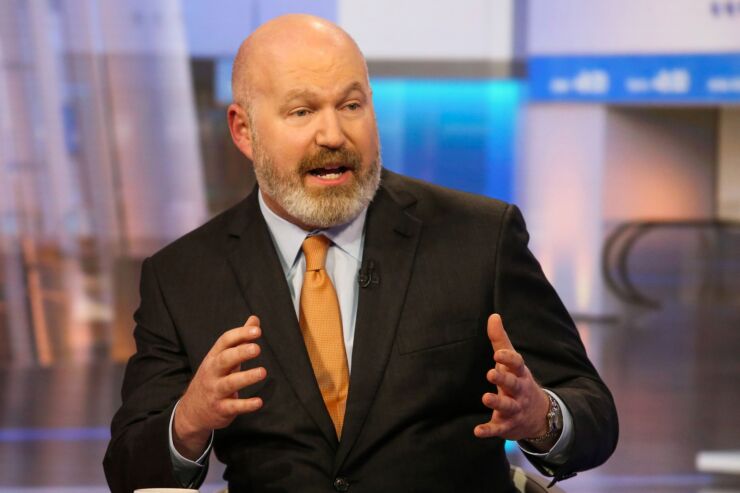Days two and three of Morningstar’s annual investment conference in Chicago surfaced strong theses on value stocks, inflation and Putin. Here’s a rundown, plus what roughly 2,500 attendees (including Morningstar staffers) wore and the best corporate SWAG.
The only constant is change
- Cliff Asness, a co-founder and the chief investment officer at AQR Capital Management, said he’s bullish on value stocks, or shares that are cheap relative to earnings or other measures.

Cliff Asness, a co-founder and the chief investment officer of AQR Capital Management. Bloomberg News - Asness told Ben Johnson, Morningstar’s director of global ETF and passive strategies research, that he was “really confident” of the value orientation of his $145 billion quantitative firm. Still, the billionaire hedge fund manager said that while value looked good “on a three-year horizon,” failing to diversify into other strategies was a mistake.
- The put-your-eggs-in-multiple-baskets approach also applies to ESG, or environmental, social and governance investing, Asness said: “There’s no world where constraints make you better.”
Blindness and insight
- Mary Childs, the author of “The Bond King: How One Man Made a Market, Built an Empire, and Lost It All,” a biography of PIMCO founder Bill Gross, recalled the quirky investor’s surprising speech at Morningstar’s conference in June 2014. Gross, who had grown PIMCO into the world’s largest bond fund manager, took the stage wearing dark sunglasses, leaving many in the audience of roughly 2,000 attendees scratching their heads.

Mary Childs, the author of a biography of PIMCO founder Bill Gross, at Morningstar's 2022 annual conference in Chicago. Financial Planning - Though he later removed them, something was clearly off. Three months later, Gross stunned Wall Street when he quit PIMCO over clashes with senior executives that resulted in the departure of his heir apparent, economist Mohamed El-Erian. Said Childs of the famously erratic Gross: “He allowed himself to lose sight of his own risk management.”
'The Churchill of our time'
- That’s what Michael McFaul, a former U.S. ambassador to Russia, called Ukrainian President Volodymyr Zelenskyy. McFaul, who served as the top U.S. diplomat to Russia from 2012-2014, likened Russia’s invasion of Ukraine to the disastrous Soviet invasion of Afghanistan in 1979 and said the West was “overestimating” Russians’ support for their president, Vladimir Putin.
- McFaul advocated for sanctions on “the top 100 oligarchs” as well as Westerners on the boards of Russian companies, including former German Chancellor Gerhard Schröder, a Putin ally on the boards of energy giants Rosneft and Gazprom.
- McFaul, a political science professor at Stanford University and a fellow at the Hoover Institution, added that “we don’t know how this war is going to end.”
Money gets emotional

- Jenny Johnson, the president and CEO of Franklin Templeton Investments, said advisors should lean into ESG investing. “We want to be emotional about our money, and we want to know it's doing good,” she said, adding that “I don't think that you have to give up the return for impact.”
Inflation and retirement:
- David Blanchett, the managing director and head of retirement research for PGIM DC Solutions, a unit of Prudential Financial, and Karsten Jeske, the founder of Early Retirement Now, a research firm, discussed actionable ways for retirees to feel financially safe amid rising consumer prices. “Just because we had an economic shock doesn’t mean we need to throw out everything we know about retirement spending,” Jeske said.
The new business dress code:
- Morningstar asked attendees to wear “business attire,” and in the third year of the pandemic, people obliged in varying ways. Financial Planning saw a lot of running shoes, rumpled travel trousers and tie-less shirts. And a pair of pink and green Lilly Pulitzer pants. Still, women attendees generally did a better pandemic job of dressing professionally than the men.
- Thomas Jones, the interim CEO of Smartchase, a Canadian publicly traded platform of private investments for advisors, went all in for casual, sporting khaki shorts, a refined sweatshirt and leather deck shoes. Dress codes “are not the same since COVID,” he said.

Tom Jones, the interim CEO of Smartchase Corp. of Toronto. Financial Planning - Mary Ellen Stanek, the president of Baird Funds and the co-chief investment officer of Baird Advisors, defined the new dress code for women executives in a tweedy Chanel (or Chanel-esque) suit, flat sandals and flawless red pedicure.


SWAG:
- The best gets were alternative investment platform CAIS’s purple ribboned box of truffles from Vosges Haut-Chocolat and something that at first glance resembled a set of dentist’s tools.
- Those turned out to be a metal straw kit, complete with a cleaning brush, from J.P. Morgan Asset Management.









